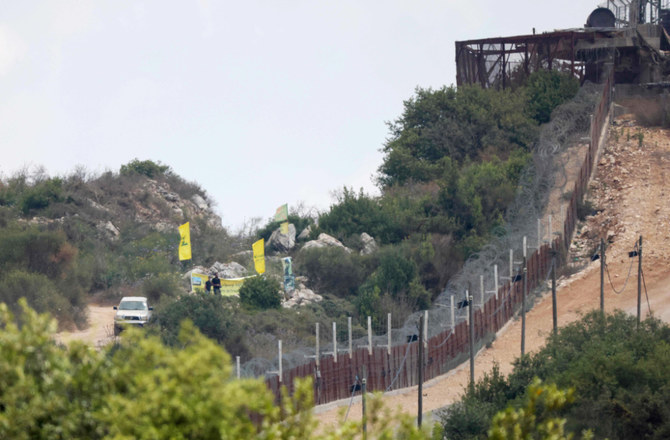BEIRUT: Lebanon’s prime minister and foreign minister have criticized Hezbollah for sending three drones over an Israeli gas installation last week, saying any interference in US-mediated talks to demarcate the country’s maritime border with Israel was “unacceptable.”
The comments followed the movement’s launch of unarmed reconnaissance drones on Saturday toward the offshore Karish gas field.
Lebanon announced its official “rejection of the incident, which took place outside the framework of the state's responsibility and the diplomatic context, especially since the indirect negotiations to demarcate the maritime borders are underway and the efforts from US mediator Amos Hochstein have reached advanced stages.”
FASTFACT
The official position included the demand to stop the ‘continuous Israeli violations of Lebanon’s sovereignty by sea, land, and air.’
Caretaker Prime Minister Najib Mikati and Foreign Minister Abdullah Bouhabib on Monday affirmed Lebanon’s support for Hochstein’s efforts to reach a solution that preserved “Lebanese rights in full and with complete clarity, and the demand to speed up the pace of negotiations.”
“Lebanon is counting on continued American efforts to support it, preserve its rights to its water wealth, and restore its economic and social strength,” they said. “Lebanon considers that any action outside the framework of the state's responsibility and the diplomatic context in which negotiations are taking place is unacceptable and exposes it to unnecessary dangers.
“Therefore, we call upon all parties to show a spirit of high national responsibility and abide by the previous declaration, which states that everyone without exception is behind the state in the negotiation process.”
The official position included the demand to stop the “continuous Israeli violations of Lebanon's sovereignty by sea, land, and air.”
Lebanon’s position on the drone incident is advanced, especially since Hezbollah and its allies still constitute a majority in authority.
The anti-Hezbollah grouping Our Lady of the Mountain Gathering, which includes political and intellectual figures, said the movement’s drone launch came hours after it leaked information about the Israeli response to Lebanon’s proposals on the maritime border demarcation that had been handed to Hochstein.
“This confirms that Hezbollah, which previously announced that it is behind the decision of the Lebanese state in the matter of demarcating the maritime borders in the south, is actually behind Iran's decision to demarcate the borders of its influence in the region, and the Lebanese demarcation file is nothing but a card in its (Hezbollah's) hands, on behalf of Iran and above the interests of the afflicted Lebanese people,” it added.
Reports said that Hochstein had made progress on the possibility of moving the indirect negotiations again after Lebanese authorities, represented by President Michel Aoun, Parliament Speaker Nabih Berri, and Mikati, abandoned the demand for Line 29 and the adoption of Line 23.
Lebanon has been unable to confirm that Line 29 — which includes the Karish gas field — is the maritime border of Lebanon due to the failure of Aoun to sign a draft amendment to Decree 6433.
It was issued in 2011 and specified that Line 23 was the point for negotiations with Israel to demarcate the maritime borders. However, Aoun considers Line 29 to be the point for negotiations.
Line 29 gives Lebanon an additional area estimated at 1,430 square km while, according to the decree deposited with the UN, Lebanon only gets 860 square km of the disputed area.
Lebanon is also dealing with the issue of Syrian refugees, with Aoun seeking to achieve a breakthrough before the end of his term in October.
The minister of the displaced in the caretaker government, Issam Sharaf El-Din, affirmed Lebanon's “total rejection of Syrian refugees not returning to their country after the war ended and it became safe.”
After meeting Aoun, Sharaf El-Din said that Lebanon planned to repatriate 15,000 displaced people per month.
He referred to proposals submitted by Lebanon to UNHCR regional director Ayaki Ito, who promised to refer the issue to his superiors and get a written answer.
The minister also referred to a plan to form a tripartite committee with the Syrian state and the UNHCR, and a four-party committee with Turkey, Iraq, and Jordan to achieve repatriation targets.
He claimed to be in touch with the Syrian side and said it was extending its hand to cooperate and facilitate the repatriation in a dignified and safe manner.
“There was an understanding with the regional director of the UNHCR regarding the request for the Syrian state to establish a tripartite committee that includes the Syrian state, the Lebanese state, and the UNHCR. If this committee is established, we will have made an important step. We proposed that the refugees receive material and in-kind assistance in Syria. Unfortunately, this was not accepted.
“We asked the UNHCR to stop aid for the 15,000 refugees whose turn comes to return to their country every month because paying aid to them in Lebanon is an incentive for them to stay in Lebanon.”
Sharaf El-Din said there was a meeting with the Turkish ambassador to Lebanon, who was understanding and cooperative.
“We agreed on the gradual repatriation based on village-by-village or district-by-district.”
He said the Turkish side had an idea to establish a safe zone where refugees would return, but it was a political issue that Lebanon had nothing to do with.
“However, we agreed to form a quadripartite committee that includes the Turkish state, which hosts 3,700,000 Syrian refugees, Lebanon, which hosts 1,500,000 refugees, Iraq, which hosts 170,000 refugees, and Jordan, which hosts 670,000 refugees, so that there will be a unified demand with UN agencies to facilitate the repatriation of refugees humanely.”

























